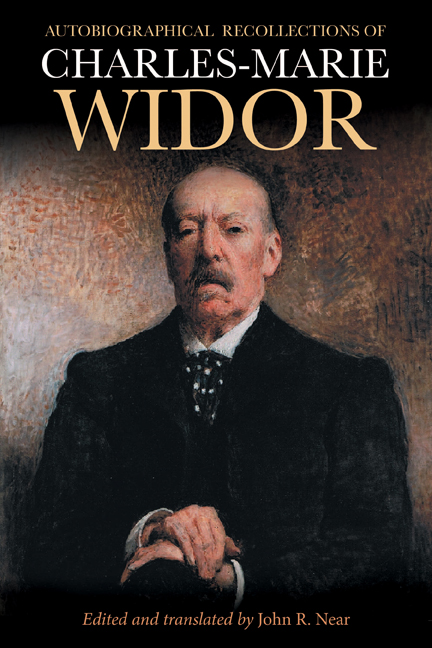Book contents
- Frontmatter
- Contents
- List of Illustrations
- Foreword
- Preface
- Acknowledgments
- Introduction: Tribute to Charles-Marie Widor
- Part One Studies, Early Performances, and Aristide Cavaillé-Coll (1844–69)
- Part Two La Belle Époque: The Franco-Prussian War to The Great War (1870–1914)
- Part Three The Great War and Important Initiatives (1914–37)
- Appendix 1 Birth record of Charles-Marie Widor, 1844
- Appendix 2 Widor’s Diplôme de Bachelier ès Lettres, 1863
- Appendix 3 Widor’s letter of appreciation to Jacques Lemmens, 1863
- Appendix 4 Brussels Ducal Palace organ specification, 1861
- Appendix 5 Widor’s certificate for Chevalier de l’Ordre du Christ, 1866
- Appendix 6 “To Budapest,” 1893
- Appendix 7 Widor’s travels to Russia and his 1903 passport
- Appendix 8 Widor’s list of his works in 1894
- Appendix 9 The Paris Conservatory organs, 1872
- Appendix 10 Chronique [Widor’s appeal for an organ hall at the Paris Conservatory, 1895]
- Appendix 11 Widor’s certificate for the Académie Royale, Brussels, 1908
- Appendix 12 “Debussy & Rodin,” 1927
- Appendix 13 The American Conservatory organ, Fontainebleau, 1925
- Appendix 14 Letters concerning the Trocadéro organ restoration, 1926
- Notes
- Bibliography
- Index
- Eastman Studies in Music
2 - 1863: Studies with Lemmens and Fétis
Published online by Cambridge University Press: 09 May 2024
- Frontmatter
- Contents
- List of Illustrations
- Foreword
- Preface
- Acknowledgments
- Introduction: Tribute to Charles-Marie Widor
- Part One Studies, Early Performances, and Aristide Cavaillé-Coll (1844–69)
- Part Two La Belle Époque: The Franco-Prussian War to The Great War (1870–1914)
- Part Three The Great War and Important Initiatives (1914–37)
- Appendix 1 Birth record of Charles-Marie Widor, 1844
- Appendix 2 Widor’s Diplôme de Bachelier ès Lettres, 1863
- Appendix 3 Widor’s letter of appreciation to Jacques Lemmens, 1863
- Appendix 4 Brussels Ducal Palace organ specification, 1861
- Appendix 5 Widor’s certificate for Chevalier de l’Ordre du Christ, 1866
- Appendix 6 “To Budapest,” 1893
- Appendix 7 Widor’s travels to Russia and his 1903 passport
- Appendix 8 Widor’s list of his works in 1894
- Appendix 9 The Paris Conservatory organs, 1872
- Appendix 10 Chronique [Widor’s appeal for an organ hall at the Paris Conservatory, 1895]
- Appendix 11 Widor’s certificate for the Académie Royale, Brussels, 1908
- Appendix 12 “Debussy & Rodin,” 1927
- Appendix 13 The American Conservatory organ, Fontainebleau, 1925
- Appendix 14 Letters concerning the Trocadéro organ restoration, 1926
- Notes
- Bibliography
- Index
- Eastman Studies in Music
Summary
When my studies were completed, my father, who was a very close friend of Aristide Cavaillé-Coll, decided, on his advice, to send me to Brussels to perfect my music studies with two illustrious masters of whom he was the friend: one, Jacques Lemmens, professor of organ; the other, François-Joseph Fétis, professor of composition and director of the [Brussels] Conservatory. I was to stay for a year in Brussels, from 1862 to 1863. This year of study decided my career.
After teaching composition at the Paris Conservatory, Fétis was called to become director of the new Brussels Conservatory. He was a first-class musicologist and also a contributor to the Gazette musicale. All musicians know his remarkable Dictionnaire des musiciens. From the teaching at his Conservatory, you can judge his authority and the reputation that he made for this outstanding establishment.
Subjected to the strict discipline of Fétis and Lemmens, my every moment was devoted to work. Every morning, Fétis gave me a fugue subject that I had to work on during the day and take back to him the next morning. Since I practiced the organ all day, I spent two or three hours in the evening writing my daily four-part fugue. I didn't try to be original, but my fugue had to be impeccably correct. The next morning at seven o’clock I would knock on Fétis's door, and he would correct my work. When the students of the Conservatory arrived in their turn around eight o’clock, the maître would read it to them, commenting on it. As for myself, I was a private pupil of Fétis, as were two other young men, one of whom was a very gifted Alsatian named Sieg, who died prematurely.
I had little time left for recreation. Only on Sundays did I join a small club of musicians at a town pub, where I had been introduced by Alphonse Mailly, a pupil of Lemmens. There, I met a nursery of remarkable violinists in Brussels at the time, notably Henri Vieuxtemps, Hubert Léonard, César Thomson, and the young Eugène Ysaÿe.
In Brussels, I also knew Charles-Auguste de Bériot, who had married Maria Malibran; her sister Pauline Viardot inspired Camille Saint-Saëns. I also knew Peter Benoit, director of the Antwerp Conservatory, who later came to perform his oratorio with organ and orchestra at the Trocadéro.
- Type
- Chapter
- Information
- Publisher: Boydell & BrewerPrint publication year: 2024



